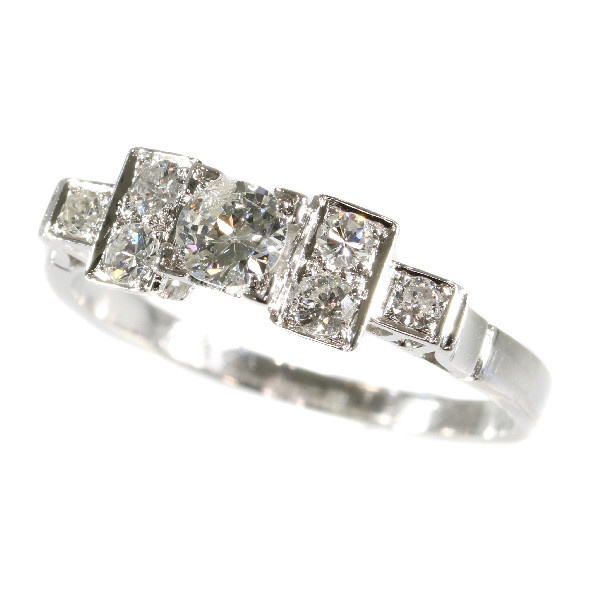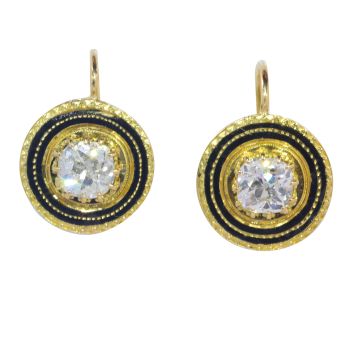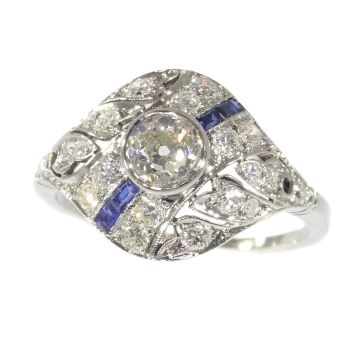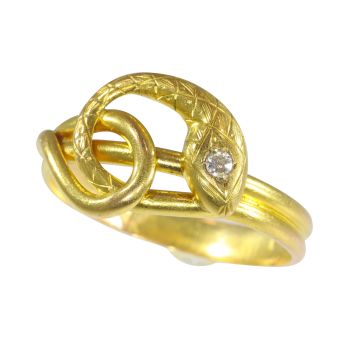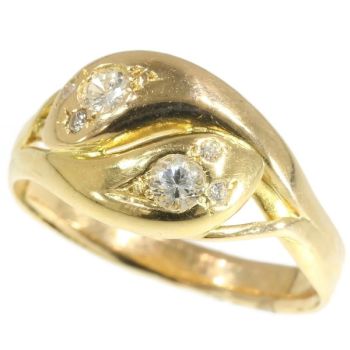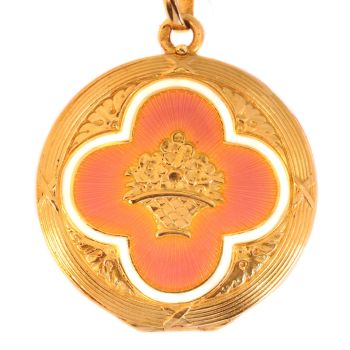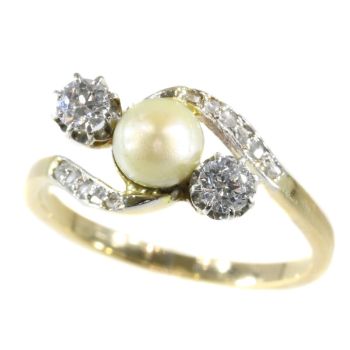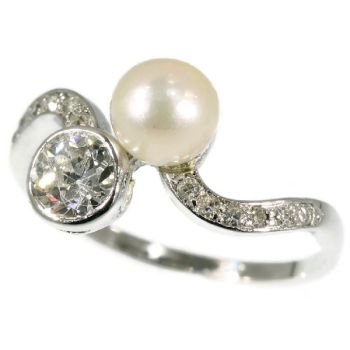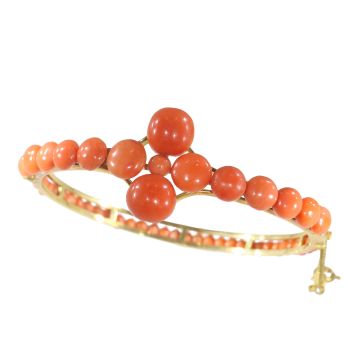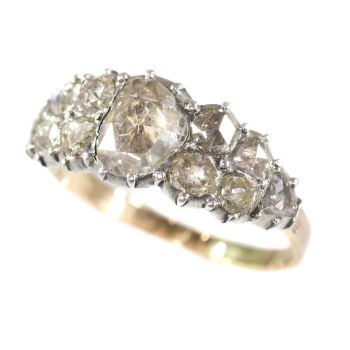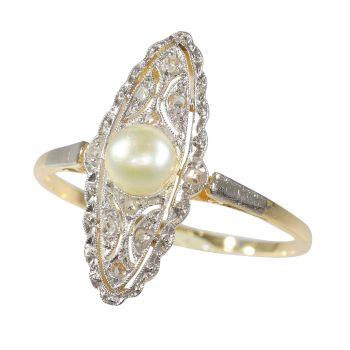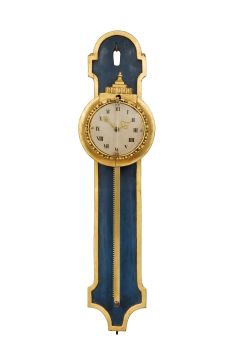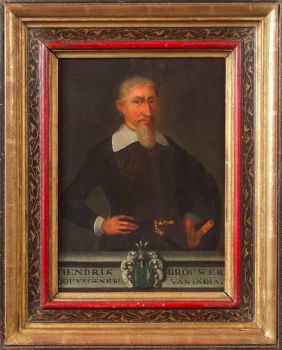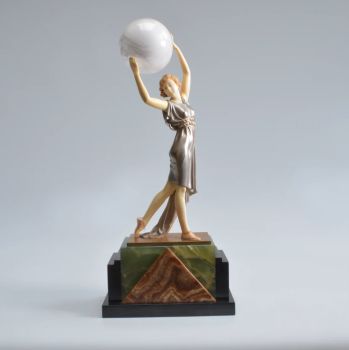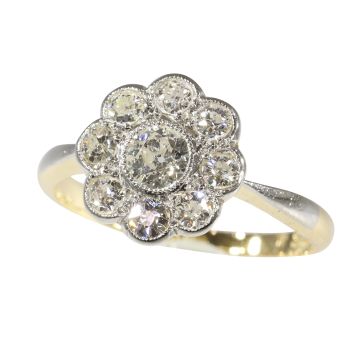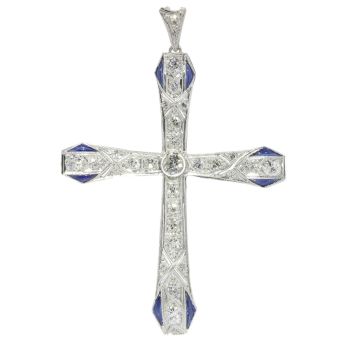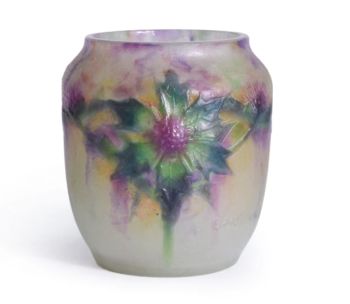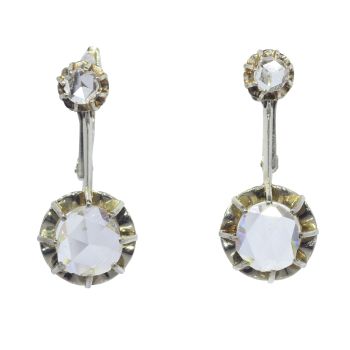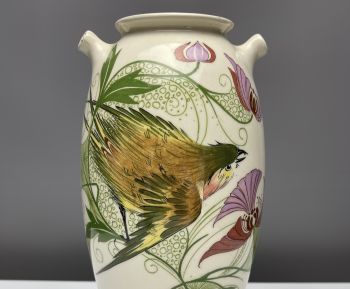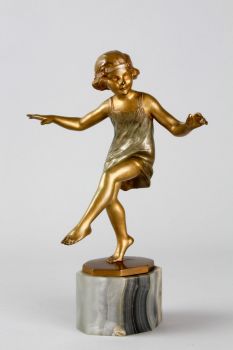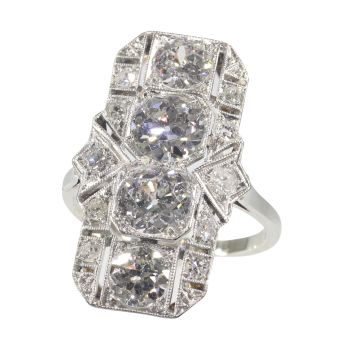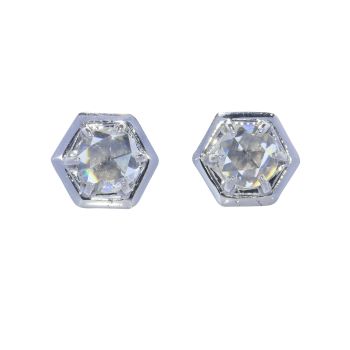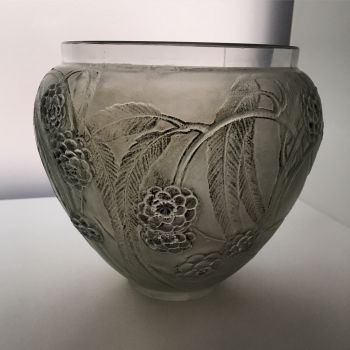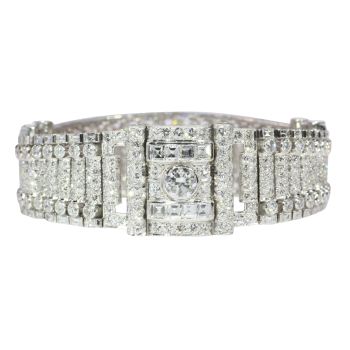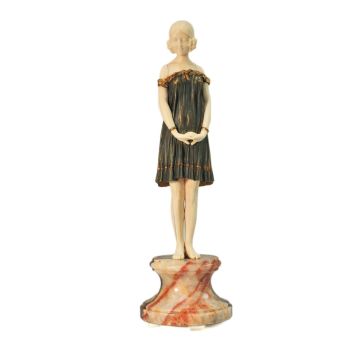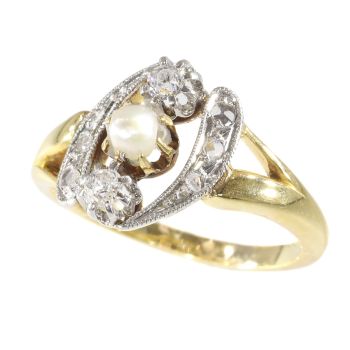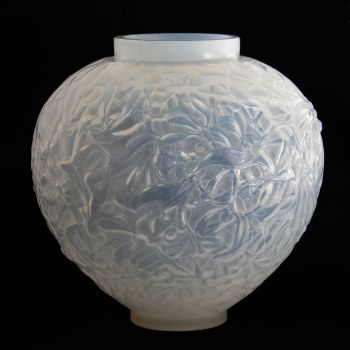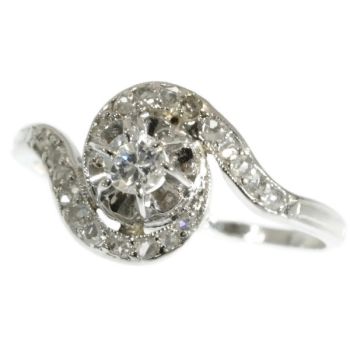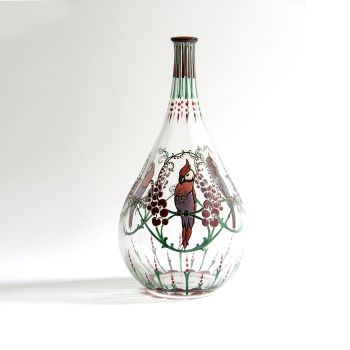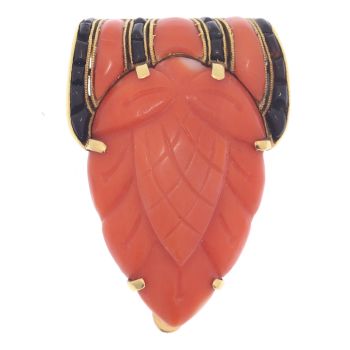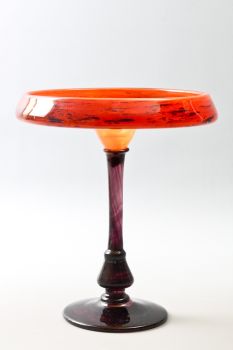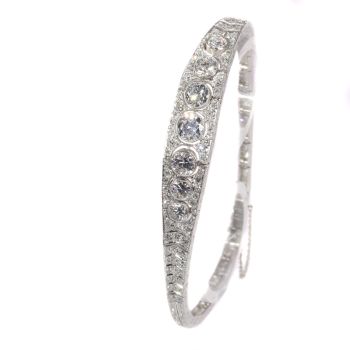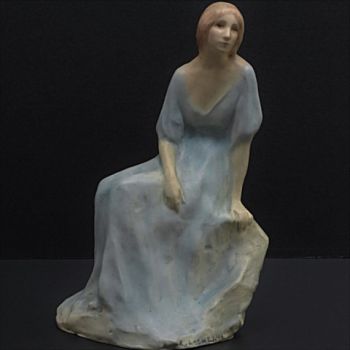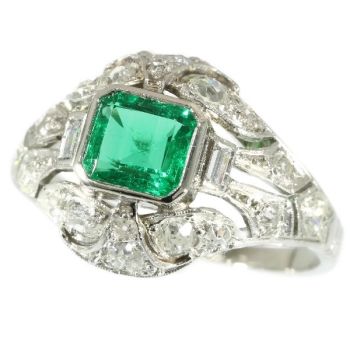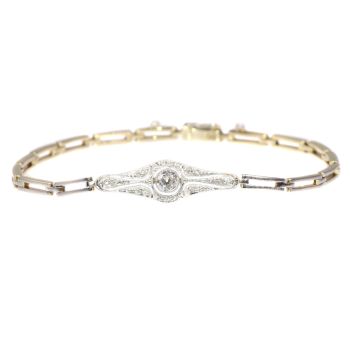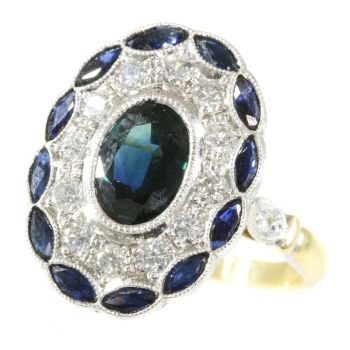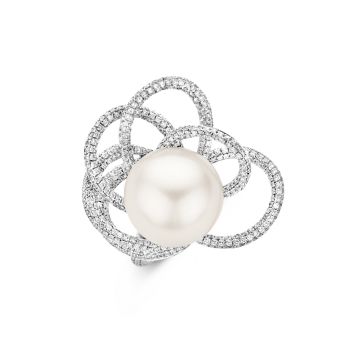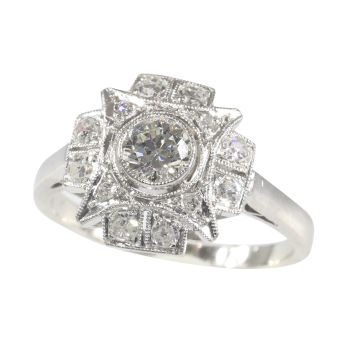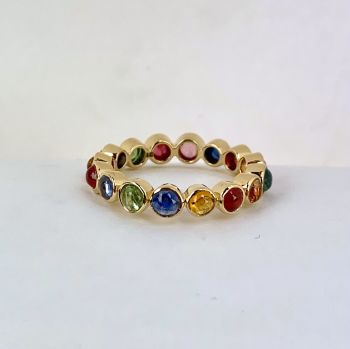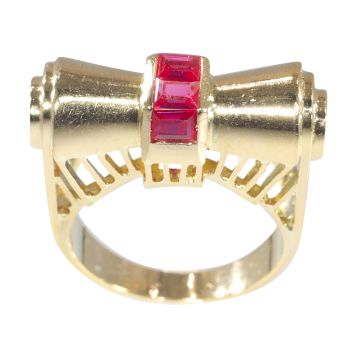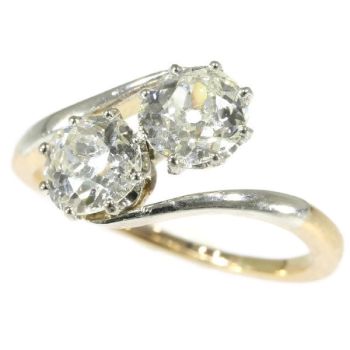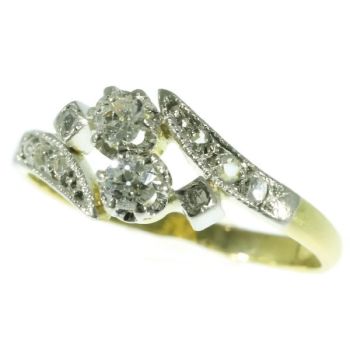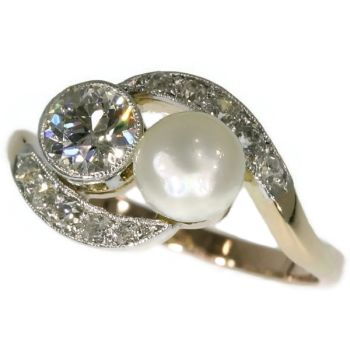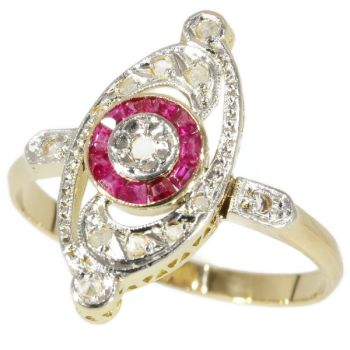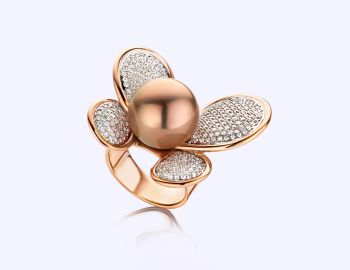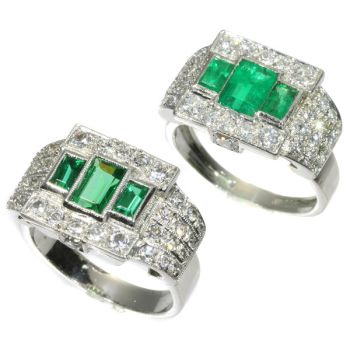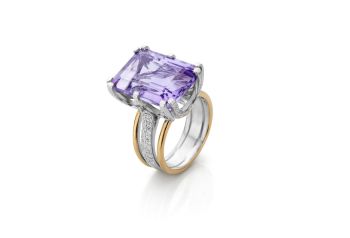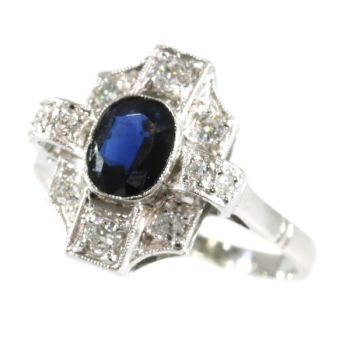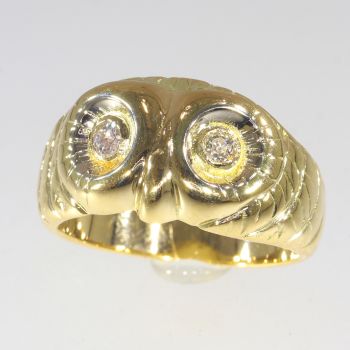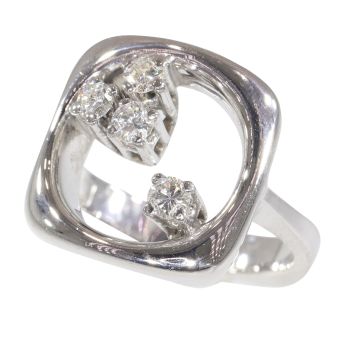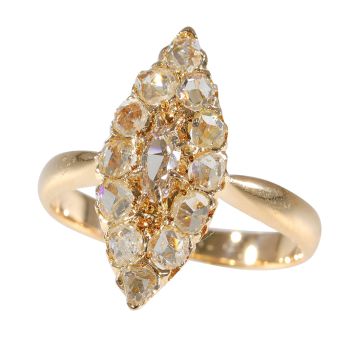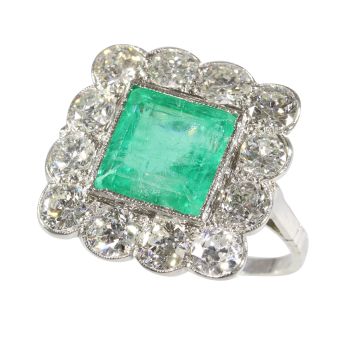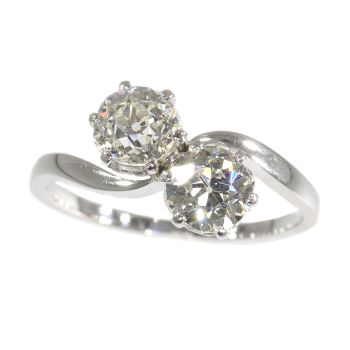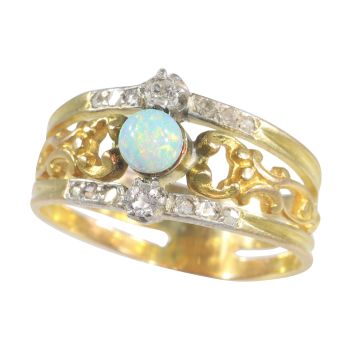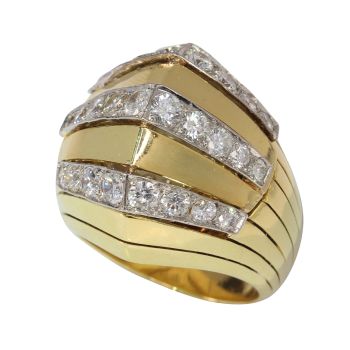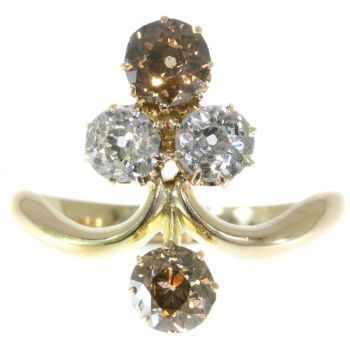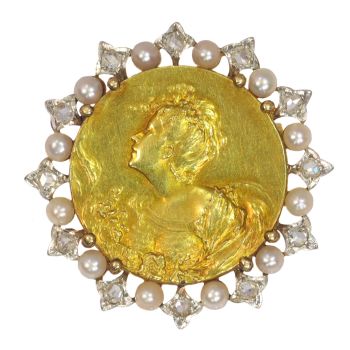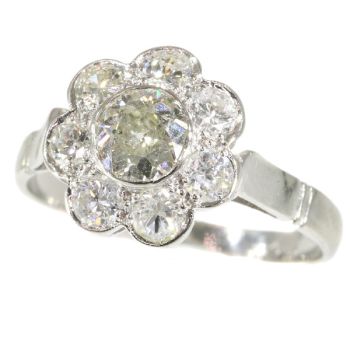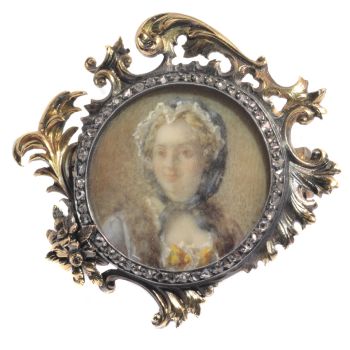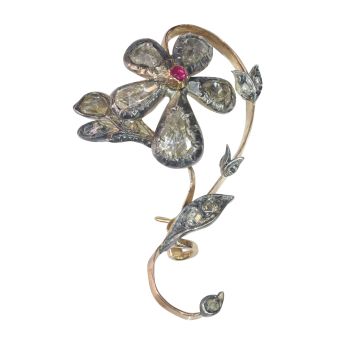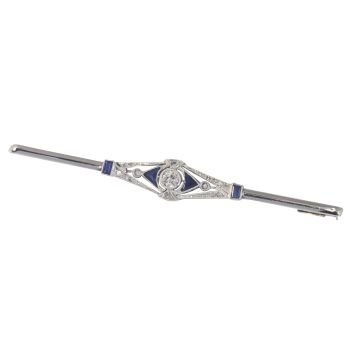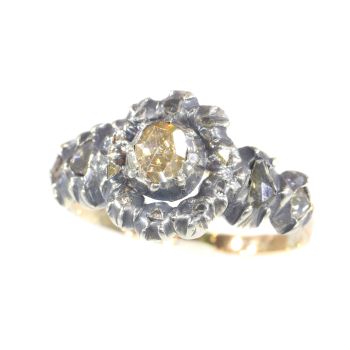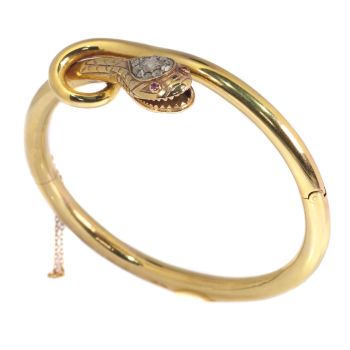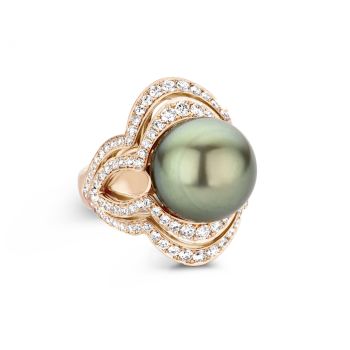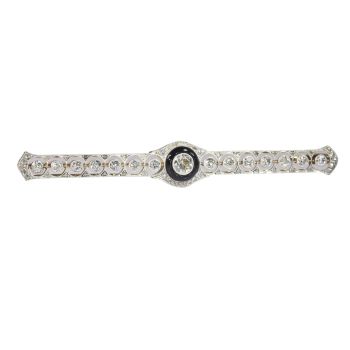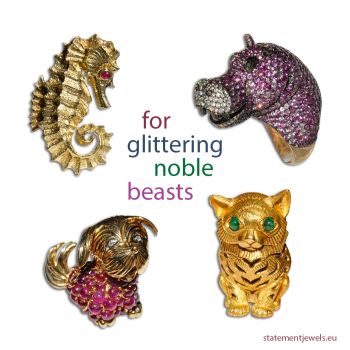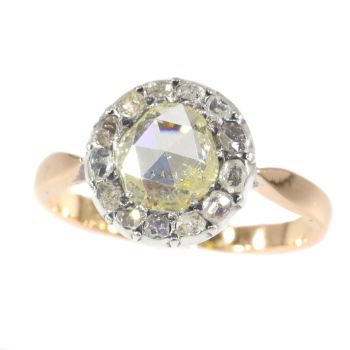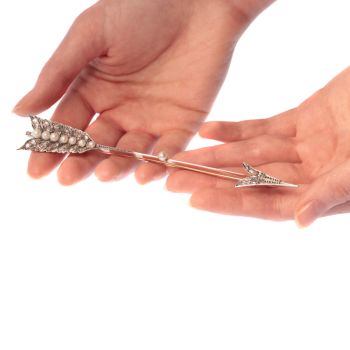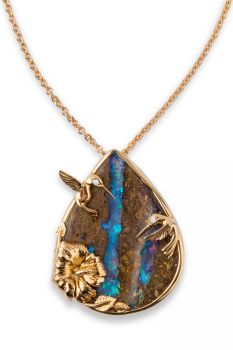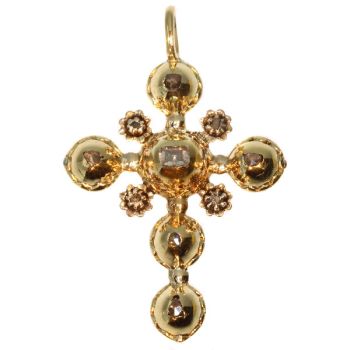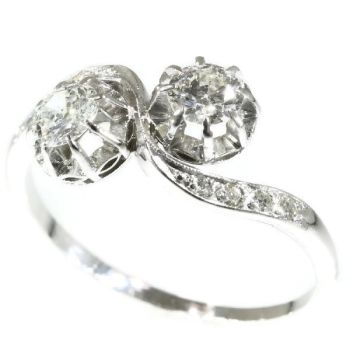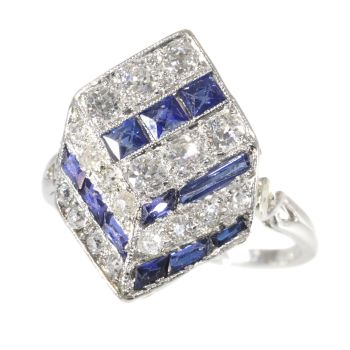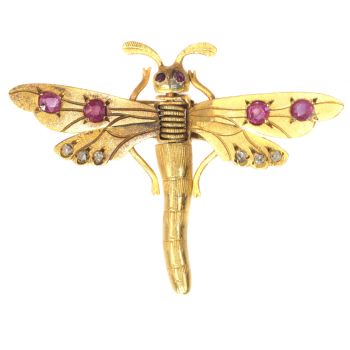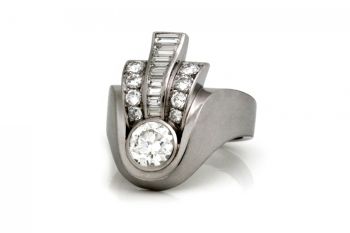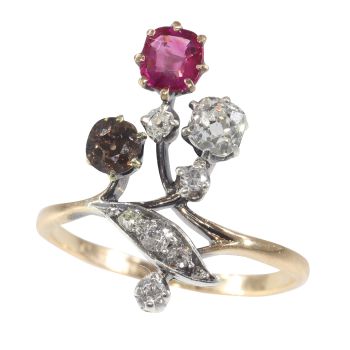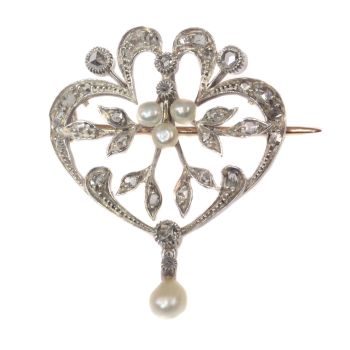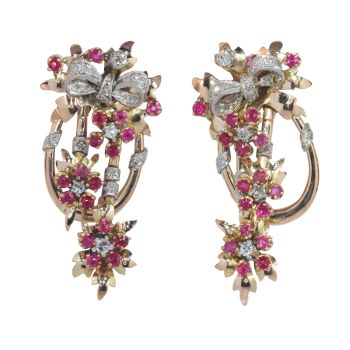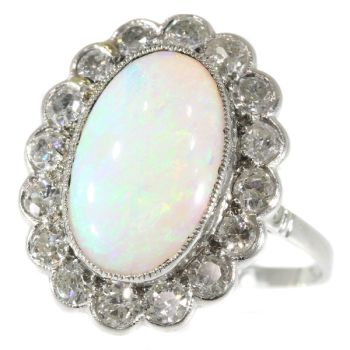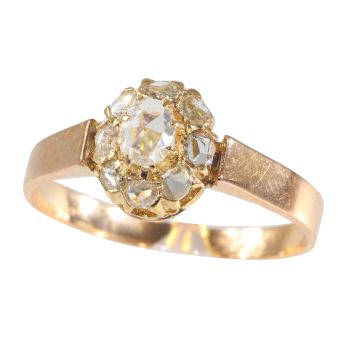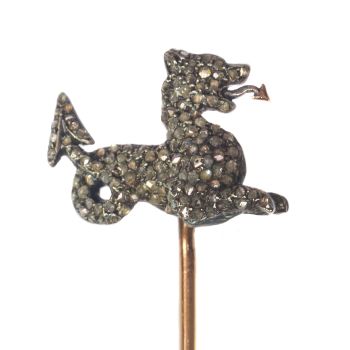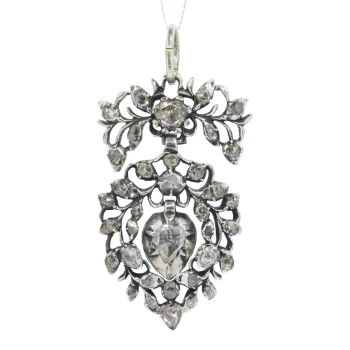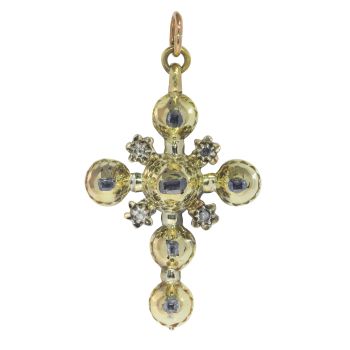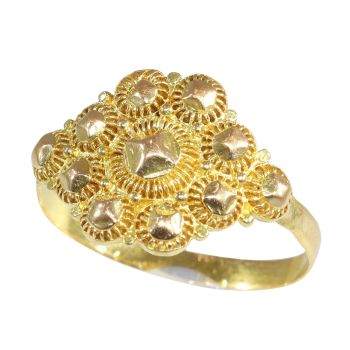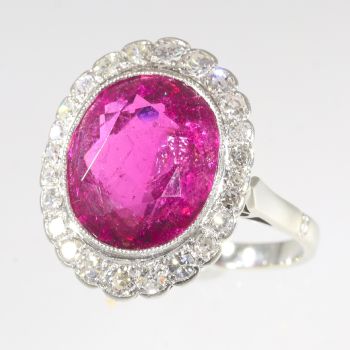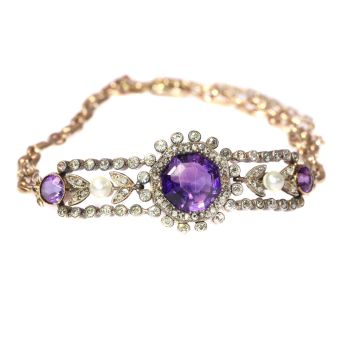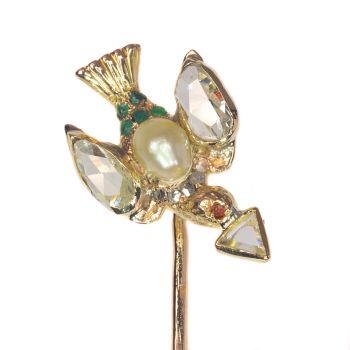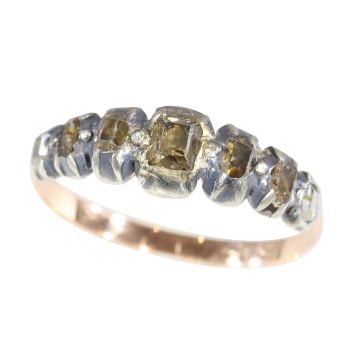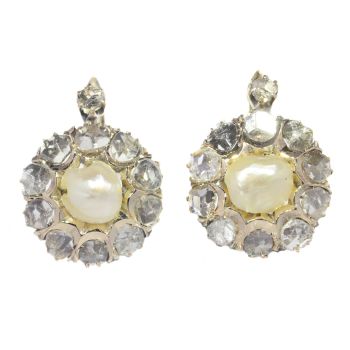Anel de noivado de diamantes Art Déco em platina vintage 1930
Artista Desconocido
DiamantePiedra preciosa
€ 2.450
Adin Fine Antique Jewellery
- Sobre la obra de arte
Antique jewelry object group: engagement ring (or anniversary ring)
Condition: excellent condition
- (more info on our condition scale)
Country of origin:Although it does not carry any legible control marks we believe this to be of Belgian origin.
Style: Art Deco - Art Deco is an eclectic artistic and design style which had its origins in Paris in the first decades of the 20th century. The style originated in the 1920s and continued to be employed until after World War II. The term "art deco" first sawwide use after an exhibition in 1966, referring to the 1925 Exposition Internationale des Arts Décoratifs et Industriels Modernes that was the culmination of high-end style modern in Paris. Led by the best designers in the decorative arts such asfashion, and interior design, Art Deco affected all areas of design throughout the 1920s and 1930s, including architecture and industrial design, as well as the visual arts such as painting, the graphic arts and film. At the time, this style was seen aselegant, glamorous, functional and modern.
- See also: Art Decoor more info on styles
Style specifics: Abstract motives and geometrical forms are quite typical for the Art Deco period. Art Deco moved away from the soft pastels and organic forms of its style predecessor, Art Nouveau, and embraced influences from many different styles and movements of the early 20th century, including Neoclassical, Constructivism, Cubism, Modernism, and Futurism. Its popularity peaked in Europe during the Roaring Twenties and continued strongly in the United States through the 1930s. Although many design movements havepolitical or philosophical roots or intentions, Art Deco was purely decorative.
Period: ca. 1930
- (events & facts of this era, poetry of this era, fashion of this era)
Material: platinum
- (more info on precious metals)
Extra information: Diamond is the birthstone for the month of April, and besides being the most popular gemstone for engagement rings, it is also the anniversary gem for the 10th and 60th years of marriage.
Even though the diamond is the hardest of all gemstones known to man, it is the simplest in composition: it is common carbon. The ancient Greeks believed that diamonds were splinters of stars fallen to earth. It was even said by some that they were thetears of the Gods or perhaps crystallized lightning or hardened dew drops. The exact origin of diamonds remained something of a mystery for centuries.
In ancient times only kings wore diamonds as a symbol of strength, courage and invincibility. Over the centuries, the diamond acquired its unique status as the ultimate gift of love. It was said that Cupid's arrows were tipped with diamonds which have amagic that nothing else can ever quite equal.
But it wasn't until 1477, when Archduke Maximillian of Austria gave a diamond ring to Mary of Burgundy, that the tradition of diamond engagement rings began. Even the reason a woman wears it on the third finger of her left hand dates back to the earlyEgyptian belief that the vena amoris (vein of love) ran directly from the heart to the top of the third finger, left hand.
Diamond(s): One old European cut diamond with an estimated weight of ± 0.35ct.
Six brilliant cut diamonds with an estimated weight of ± 0.36ct.
Total diamond count: Seven pcs.
Total diamond weight: approx. 0.71 crt. with an average colour and clarity: G/I, si/i.
- All diamond weights, color grades and clarity are approximate since stones are not removed from their mounts to preserve the integrity of the setting.
Birthstones: Diamond is the birthstone (or month stone) for April.
- (more info on birthstones)
Hallmarks: No trace.
- (more info on hallmarks)
Dimensions: width of band at top of ring 0,62 cm (0,24 inch)
Weight: 4,60 gram (2,96 dwt)
Ring size Continental: 62 & 19¾ , Size US 10 , Size UK: T½
Resizing: Free resizing (only for extreme resizing we have to charge).
- (more info on ring sizes)
Reference Nº: 18198-0148
Copyright photography: Adin, fine antique jewelry
- Sobre el artista
Puede suceder que un artista o creador sea desconocido.
Algunas obras no deben determinarse por quién está hecho o por (un grupo de) artesanos. Algunos ejemplos son estatuas de la Antigüedad, muebles, espejos o firmas que no son claras o legibles, pero también algunas obras no están firmadas en absoluto.
También puedes encontrar la siguiente descripción:
•"Atribuido a …." En su opinión, probablemente una obra del artista, al menos en parte.
•“Estudio de….” o “Taller de” En su opinión, una obra ejecutada en el estudio o taller del artista, posiblemente bajo su supervisión
•“Círculo de…” En su opinión, una obra del período del artista que muestra su influencia, estrechamente asociado con el artista pero no necesariamente su alumno.
•"Estilo de …." o “Seguidor de…”. En su opinión, una obra ejecutada al estilo del artista pero no necesariamente por un alumno; puede ser contemporáneo o casi contemporáneo
•"Manera de …." En su opinión una obra al estilo del artista pero de fecha posterior
•"Después …." En su opinión, una copia (de cualquier fecha) de una obra del artista
•“Firmado…”, “Fechado…” o “Inscrito” En su opinión, la obra ha sido firmada/fechada/inscrita por el artista. La adición de un signo de interrogación indica un elemento de duda.
•“Con firma…”, “Con fecha…”, “Con inscripción…” o “Lleva firma/fecha/inscripción” en su opinión la firma/fecha/inscripción ha sido añadida por alguien que no es el artista
¿Está interesado en comprar esta obra de arte?
Artwork details
Related artworks
- 1 - 4 / 12
Demetre Chiparus
Demetre H. Chiparus – Bronze Art Deco statue “Rapture” – Édition Etling, Paris1920 - 1929
Precio a consultarAntiques Emporium
1 - 4 / 24- 1 - 4 / 24
- 1 - 4 / 24
- 1 - 4 / 12

